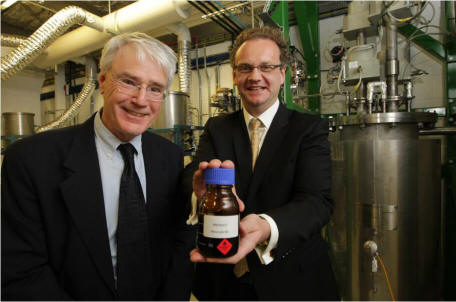Renewable Chemicals
SIEF is supporting Advanced Catalytic Processes for Renewable Chemicals Manufacture.
The challenge
To develop low energy / sustainable materials platform technologies that utilise renewable resources to produce bulk chemicals, intermediates, fine and specialty chemicals. The challenge is to invigorate the Australian agriculture and manufacturing sectors by linking them via innovative biorefinery technologies
The response
Two complementary approaches are being explored to produce renewable resources:
- Chemical Processing: Utilising hydrothermal upgrading to convert woody and algal biomass into gaseous and liquid
fractions. Further processing, separation and derivatisation of these fractions can result in the production of a range of valuable chemicals. - Enzymatic Processing: Through the development of novel, efficient, small footprint, tethered enzyme continuous
flow reactors, these reactors can be used to convert bio-derived feedstock’s (e.g. product streams from the Chemical
Processing stream) into fine and speciality chemicals.
These approaches will enable renewable resources to be developed for the future, with better environmental credentials,
all from sustainable sources.
The collaboration
The project is a collaboration between the University of Sydney and CSIRO, which builds on internationally recognised expertise in thermochemical processing, catalysis (both chemical and bio-catalyic), enzymology, chemical engineering, modelling, flow chemistry, separation and purification processes, and polymers and materials science. It is the synergistic combination of the partner’s capabilities, experience and expertise that has enabled the development of the complimentary technologies.
Projected impact
Development of technologies to manufacture renewable resources will impact in a number of areas:
- Environmental value by reducing reliance on fossil crude-oil-based chemical products (e.g. renewable resins and
composite materials). - Increased sustainability and economic value by being able to create renewable chemicals and fuels from biomass
streams ranging from wood wastes, algae, bio-solids from e.g. waste water treatment plants and food wastes. - Developments that will underpin the growth of the bio-economy in Australia.
- Production of Unique Tethered Enzyme Reactor technologies that provide efficient alternatives to chemical
production and bio-remediation challenges. The key advantage of the Enzyme reactors is the assembly of
individual enzymatic reactions into complex, co-ordinated pathways that include co-factor recycling capabilities, (i.e.
multi-enzyme ‘molecular machines’). This provides an economical advantage.
